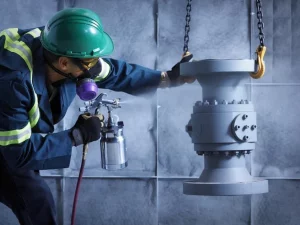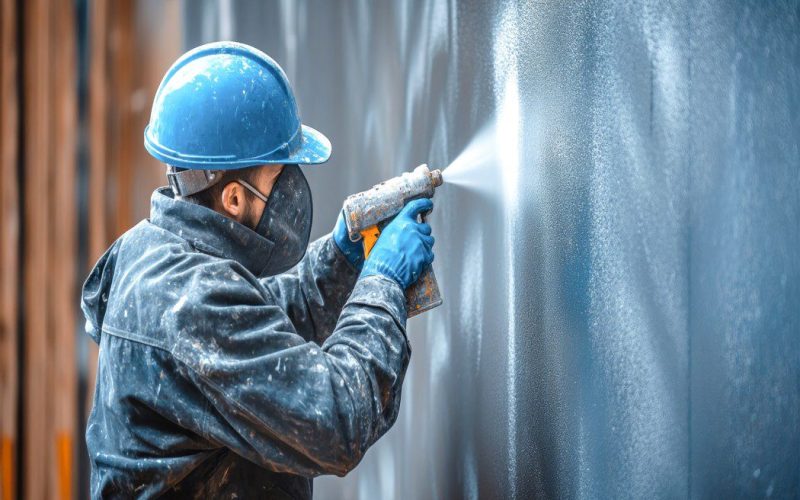Introduction
In today’s fast-paced industrial landscape, industrial coatings play a critical role in protecting and enhancing the performance of materials and infrastructure. From manufacturing plants and oil refineries to bridges and marine vessels, coatings are the unseen guardians that ensure longevity, safety, and efficiency. Understanding their types, characteristics, and benefits is essential for engineers, manufacturers, and decision-makers who aim to improve operational performance and asset life.
What Are Industrial Coatings?
Industrial coatings are specialized surface finishes formulated to protect metal, concrete, and other materials from environmental damage, corrosion, wear, and chemical exposure. Unlike decorative paints, industrial coatings are performance-driven. They are engineered for durability, adhesion, resistance to chemicals or abrasion, and specific environmental conditions.
These coatings are widely used in sectors such as construction, automotive, aerospace, energy, and manufacturing, where materials face constant exposure to stress, moisture, and temperature extremes.
The key reasons for applying industrial coatings are:
- Protection: Prevents degradation from corrosion, rust, and wear.
- Enhanced Durability: Increases the lifespan of materials and structures.
- Improved Performance: Enhances the functionality of machinery and equipment.
- Aesthetic Appeal: Provides a polished and clean finish to equipment and infrastructure.
Main Types of Industrial Coatings

The world of industrial coatings is diverse, each type designed for specific performance demands. Below are some of the most common and effective categories:
1. Epoxy Coatings
Epoxy coatings are known for their outstanding adhesion, chemical resistance, and mechanical strength. They are widely used on concrete floors, pipelines, and industrial equipment. Epoxies form a hard, protective barrier that resists oil, solvents, and abrasion—making them ideal for heavy-duty environments like warehouses, production plants, and marine docks.
2. Polyurethane Coatings
Polyurethanes provide superior gloss retention, UV stability, and flexibility. They are often used as a topcoat over epoxy primers, combining beauty with resilience. Their resistance to weathering and color fading makes them a top choice for outdoor applications such as bridges, aircraft exteriors, and industrial machinery exposed to sunlight.
3. Zinc-Rich Coatings
Zinc coatings offer sacrificial protection against corrosion. When applied to steel structures, the zinc layer corrodes preferentially, shielding the underlying metal. These coatings are commonly used in steel fabrication, offshore structures, and pipelines where corrosion protection is paramount.
4. Acrylic Coatings
Acrylic coatings are valued for their quick-drying properties, color retention, and environmental friendliness. They are often used in applications where aesthetics and moderate protection are needed, such as storage tanks, structural steel, and architectural finishes.
5. Fluoropolymer Coatings
Fluoropolymers deliver exceptional chemical resistance and low surface energy, preventing dirt and contaminants from adhering to surfaces. They are ideal for environments with extreme weather or chemical exposure, such as chemical plants or marine vessels.
Key Characteristics of Industrial Coatings
Industrial coatings are defined by several critical performance characteristics:
- Corrosion Resistance: Protects metal surfaces from rust and oxidation, significantly extending lifespan.
- Chemical Resistance: Withstands harsh chemicals, oils, and solvents used in industrial processes.
- Abrasion Resistance: Maintains integrity in high-wear environments, reducing maintenance costs.
- UV and Weather Stability: Prevents degradation from sunlight, rain, and temperature fluctuations.
- Adhesion and Flexibility: Ensures coatings remain bonded under thermal expansion or vibration.
- Ease of Application: Many modern coatings are designed for efficient spray, brush, or roller application, reducing downtime.
These characteristics not only enhance performance but also influence the total cost of ownership for industrial assets.
Advantages of Using Industrial Coatings
Investing in the right coating system brings measurable benefits across industries:
- Extended Equipment Life: By preventing corrosion and surface damage, coatings significantly reduce replacement frequency and maintenance expenses.
- Improved Safety: Coatings on pipelines, tanks, and structures prevent leaks, corrosion-related failures, and other hazards.
- Operational Efficiency: A well-coated surface minimizes friction, contamination, and mechanical wear, improving energy efficiency.
- Cost Savings: Long-term protection means lower lifecycle costs, less downtime, and optimized resource use.
- Aesthetic and Brand Value: A high-quality finish maintains the professional appearance of industrial assets, supporting brand reputation and compliance.
- Environmental Compliance: Modern formulations use low-VOC or waterborne technologies, aligning with sustainability standards and regulations.
Choosing the Right Industrial Coating
Selecting the right industrial coating depends on several factors—substrate type, exposure environment, expected lifespan, and maintenance requirements. A comprehensive coating system often involves multiple layers: a primer for adhesion, an intermediate coat for protection, and a topcoat for durability and appearance.
Partnering with a reputable coating manufacturer or supplier ensures the product aligns with your specific operational challenges and compliance needs. Expert consultation and proper surface preparation are just as crucial as the coating itself.
Final Thoughts
Industrial coatings are more than surface treatments—they are strategic investments in protection, performance, and productivity. Whether safeguarding offshore platforms or factory floors, the right coating system minimizes risk and maximizes longevity. As innovation continues, the industry is seeing a surge in environmentally responsible, high-performance coatings that deliver on both durability and sustainability—ensuring that tomorrow’s infrastructure is stronger, safer, and longer-lasting.












